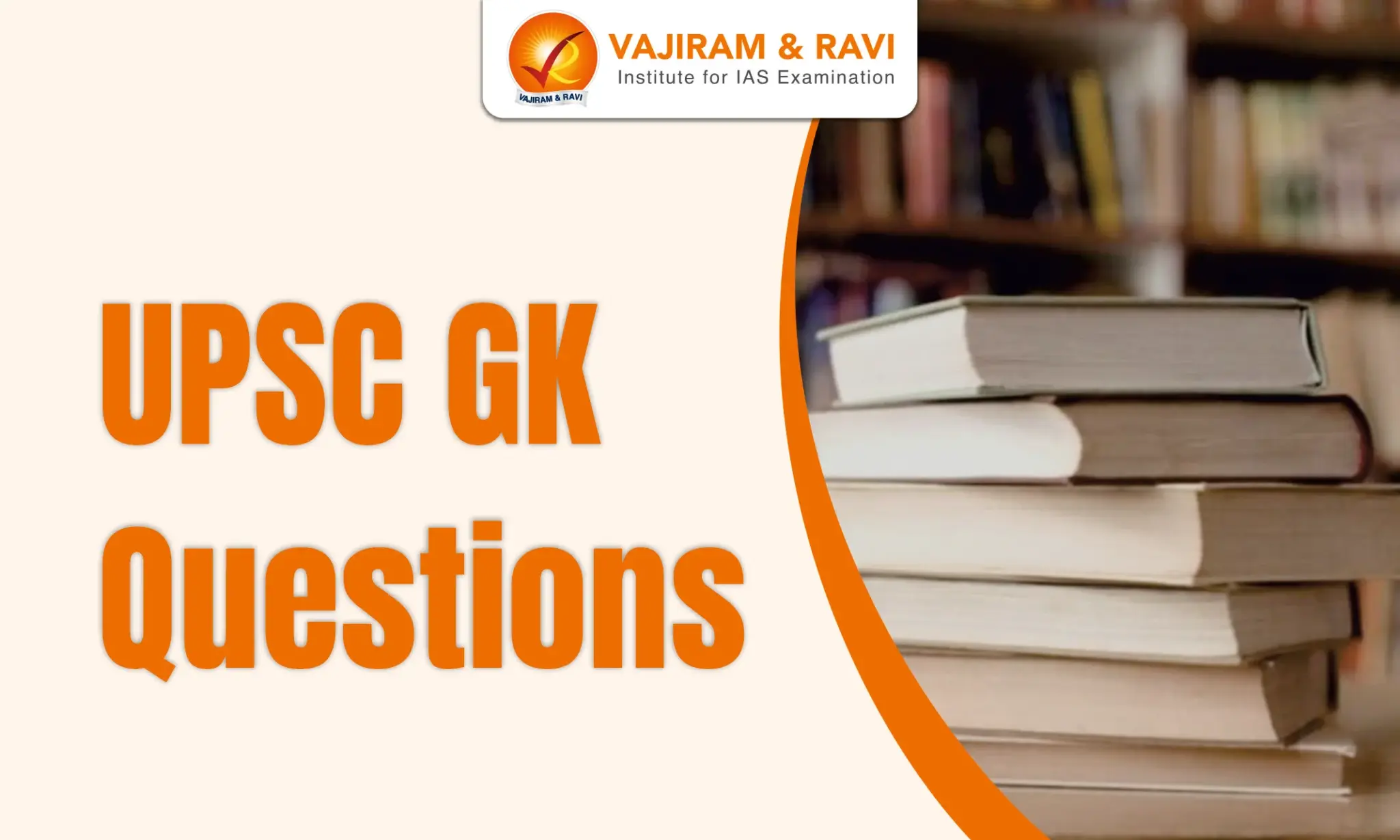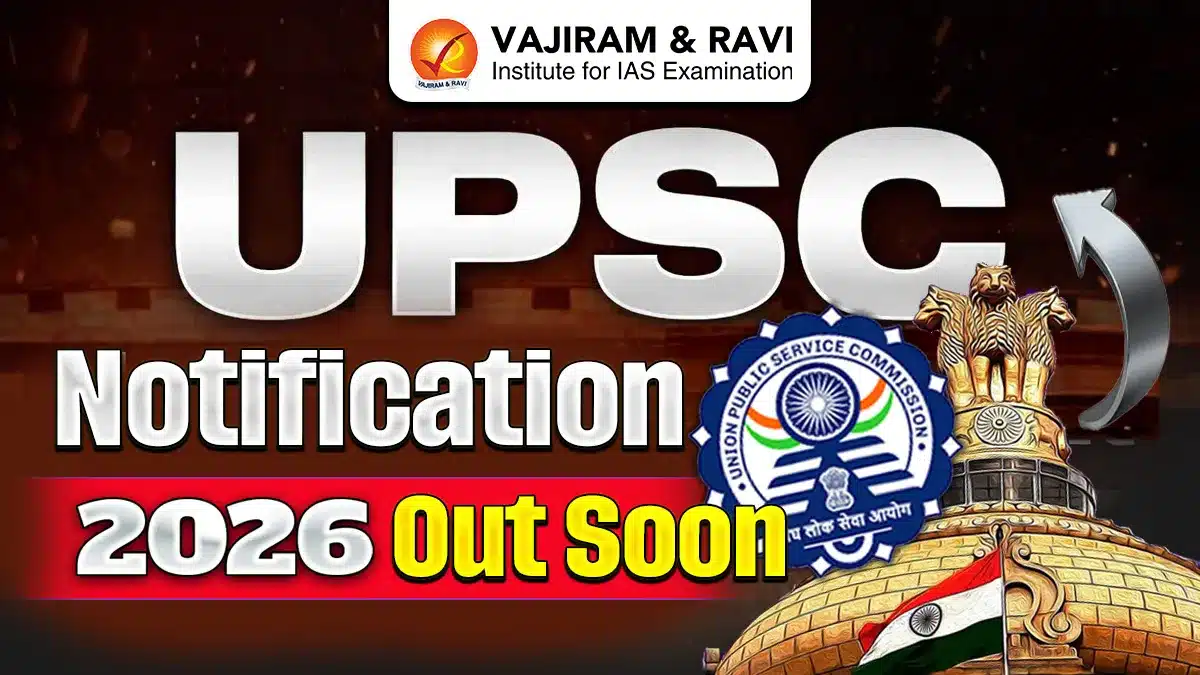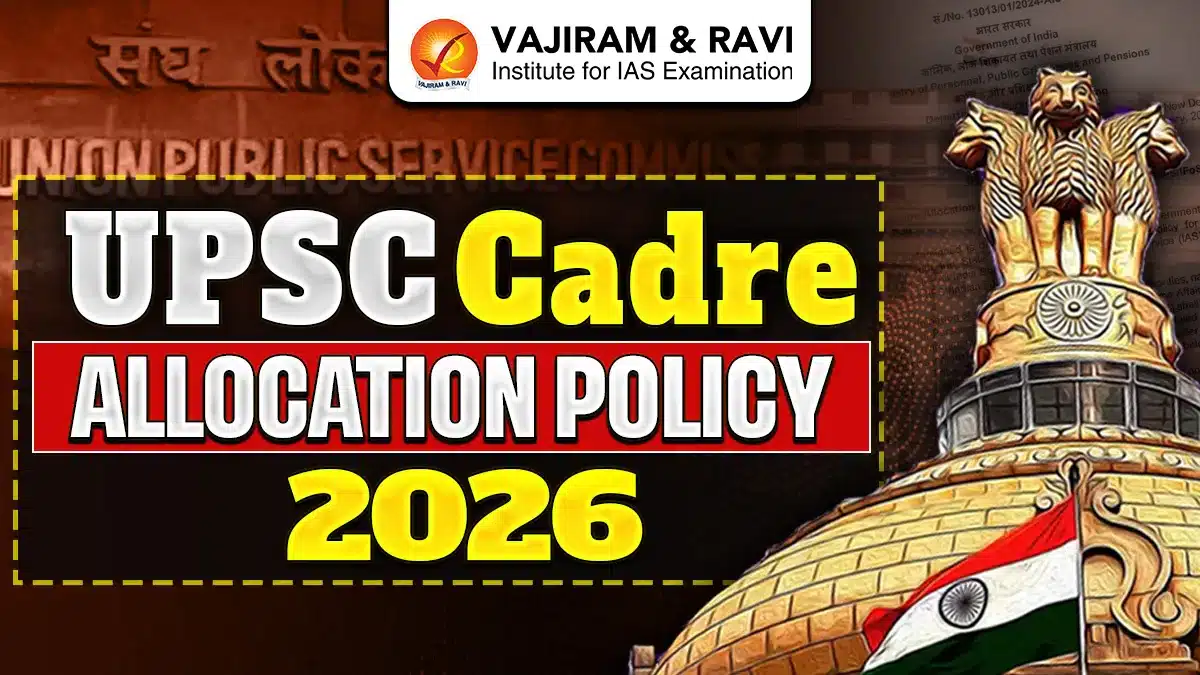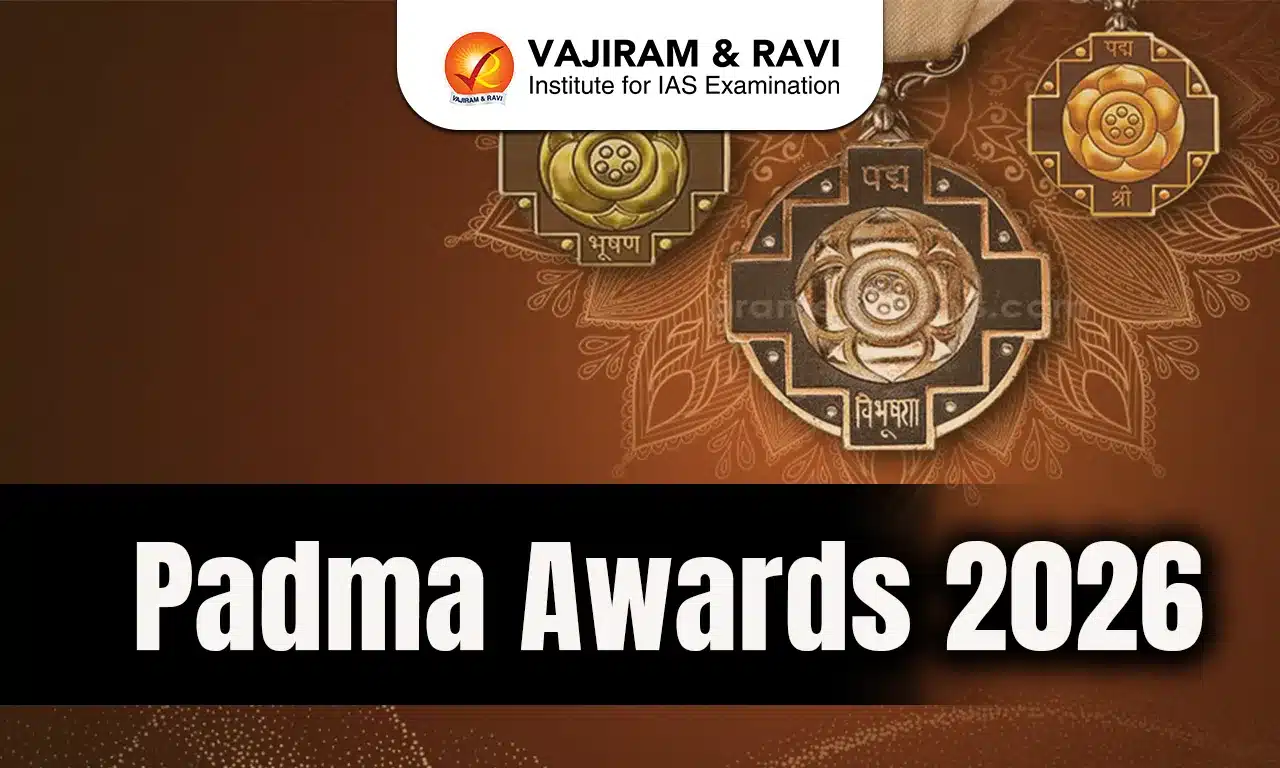UPSC GK questions are of moderate to high difficulty level, so aspirants must focus on their GK preparation. GK is an important part of the UPSC syllabus, and candidates cannot succeed in the exam without a strong foundation in General Knowledge. UPSC GK questions are also asked in other exams conducted by UPSC apart from the Civil Services exam. These questions are mostly based on current affairs.
The UPSC Preliminary Exam, also known as the Screening Test, includes questions from science, history, economics, and current events, all of which are part of General Knowledge. This shows the importance of GK for UPSC. In this article, we will discuss some of the most important UPSC GK questions. Aspirants should read this article to take their GK preparation to the next level.
UPSC GK Questions for History
The UPSC History Syllabus is divided into Ancient, Medieval and Modern History of India. Here is a list of UPSC GK Questions for History asked in the Prelims exam:
Q. In this context of colonial India, the Government of India Act of 1935 recommended the establishment of:
- Council of India
- Bicameral legislature in provinces
- Federal form of government
- Central Public Service Commission
Select the correct answer using the code given below:
a) 1 and 2 only
b) 3 and 4 only
c) 2 and 3 only
d) 1 and 4 only
Answer: c
Q.In medieval India, the term ‘Amir-i-Chahalgani’ referred to:
a) Foreign Invaders
b) Trusted Nobles
c) Women Spies
d) Agricultural labourers
Answer: b
Q. Dr. B.R Ambedkar was actively associated with which of the following?
- All India Harijan Sevak Sangh
- All India Scheduled Castes Federation
- Independent Labour Party
Select the correct answer using the code given below:
a) 1 only
b) 2 and 3 only
c) 1 and 3 only
d) 1, 2 and 3
Answer: b
Q. Consider the following statements:
The Mountbatten Plan provided for:
- two Dominions and two Constituent Assemblies
- referendum in the North-West Frontier Province
- independence of princely states
Which of the statements given above is/are correct?
a) 1 and 3 only
b) 1 and 2 only
c) 3 only
d) 2 and 3 only
Answer: b
Q. With reference to India, consider the following sites:
- Sammed Shikharji
- Shatrunjaya
- Thalaivetti Muniyappan
- Ashtapad
Which of the above are Jain pilgrimage sites?
a) 1 and 2 only
b) 1, 2 and 4 only
c) 3 and 4 only
d) 2, 3 and 4 only
Answer: b
Q. With reference to ‘Indian History’, consider the following statements:
- The first Turkish invasion of India happened during the reign of Iltutmish.
- Mahmud of Ghazni is known for his raid on Somnath Temple during his invasion of India.
- In the Battle of Tarain, Prithviraj Chauhan defeated Ghurid forces and later captured the Tabarhinda region.
Which of the statements given above is/are correct?
a) 1 only
b) 2 only
c) 2 and 3 only
d) 1 and 3 only
Answer: c
Q. With reference to the modern history of India, ‘Damin-i-Koh’ refers to:
a) duties imposed on the export of Indian handicrafts
b) revenue system imposed by the British authorities in North-east India
c) advances given by the English East India Company to merchants in Bengal
d) land exclusively demarcated for the Santhals to practise agriculture
Answer: d
Q. With reference to the ‘Anti-Compromise Conference’, consider the following statements:
- It was convened by Muhammad Ali Jinnah at the Lahore session of the Muslim League in 1940.
- It was aimed at safeguarding the political rights of Muslims in India.
Which of the statements given above is/are correct?
a) 1 only
b) 2 only
c) Both 1 and 2
d) Neither 1 nor 2
Answer: d
Q. Who among the following established the 'Mahila Seva Mandal' and 'Native Female School' in Pune?
a) Aruna Asaf Ali
b) Jhalkari Bai
c) Savitribai Phule
d) Sarla Devi Chaudharani
Answer: c
UPSC GK Questions on Indian Polity
UPSC GK questions on Indian Polity & Constitution will help you assess your basic knowledge of these concepts and fundamentals. By answering these questions, you can identify areas where you need to improve your preparation.
Q. Which of the following provisions under the Constitution of India ensures the “Principle of Checks and Balances” in Indian Polity?
- Parliament is prohibited from discussing the judicial conduct of a Supreme Court judge
- Appointment of the High Court judges by the Executive Head of the State
- Judicial review exercised by the judiciary over legislative actions
Select the correct answer using the code given below:
a) 1 and 2 only
b) 2 and 3 only
c) 1 and 3 only
d) 1, 2 and 3
Answer: b
Q. Consider the following statements:
- The Supreme Court has clearly defined the basic structure of the Constitution in the Kesavananda Bharati case.
- The limited power of Parliament to amend the Constitution is a part of the basic structure of the Constitution.
Which of the statements given above is/are correct?
a) 1 only
b) 2 only
c) Both 1 and 2
d) Neither 1 nor 2
Answer: b
Q. With reference to ‘Money Bill’, consider the following statements:
- It can be introduced only in the Lok Sabha and not in the Rajya Sabha.
- A joint sitting of both Houses of Parliament can be convened in case there is a deadlock.
- When it is presented to the President of India, it is obligatory for the President of India to give his/her assent.
Which of the statements given above is/are correct?
a) 1 only
b) 1 and 2 only
c) 3 only
d) 2 and 3 only
Answer: a
Q. Which of the following is not correct with respect to the Right to Freedom of Speech and Expression under Article 19 of the Constitution of India?
a) It is enforceable against private individuals and entities.
b) It is available to both citizens and foreigners except enemy aliens.
c) It cannot be restricted on any condition except those mentioned under Article 19.
d) It includes the right to receive and impart information through social media.
Answer: b
Q. In India, the Directorate of Enforcement (ED) is a multi-dimensional organisation investigating economic offences under which of the following legislations?
1. Prevention of Money Laundering Act, 2002
2. Foreign Exchange Management Act, 1999
3. Prevention of Corruption Act, 1988
4. Fugitive Economic Offenders Act, 2018
Select the correct answer using the code given below:
a) 1 and 2 only
b) 3 and 4 only
c) 1, 2 and 4 only
d) 1, 2, 3 and 4
Answer: c
Q. Consider the following statements with respect to the Memorandum of Procedure (MoP) for the appointment of the Chief Justice of India (CJI):
- The Ministry of Law and Justice seeks the recommendation of the outgoing CJI for the appointment of the next CJI.
- The next CJI must be appointed two months before the retirement of the outgoing CJI.
Which of the statements given above is/are correct?
a) 1 only
b) 2 only
c) Both 1 and 2
d) Neither 1 nor 2
Answer: a
Q. With reference to the ‘Delimitation Commission’, consider the following statements:
- The Minister of Home Affairs is the ex-officio member of the Delimitation Commission.
- It identifies seats to be reserved for Scheduled Castes and Scheduled Tribes in Parliamentary and State Assembly elections.
- The Parliament can modify the orders of the Delimitation Commission only by a special majority.
Which of the statements given above is/are correct?
a) 1 only
b) 2 only
c) 2 and 3 only
d) 1 and 3 only
Answer: b
Q. With reference to Indian Polity, the 'Doctrine of Proportionality' is applied by the Judiciary to test:
a) the reasonable balance between laws and government actions
b) validity of a Constitutional Amendment Act
c) encroachment by the Central Government in the legislative jurisdiction of a State
d) validity of the Speaker’s decision on the anti-defection laws
Answer: a
UPSC GK Questions on Economics
UPSC GK questions on Economics often delve into the intricate workings of the Indian economy, covering topics such as fiscal policy, monetary policy, economic reforms, and global economic trends. Aspirants must stay updated with current economic indicators and government initiatives, including budgetary allocations and trade policies. Questions may also touch upon economic theories and influential economists. A comprehensive understanding of economic concepts and their real-world applications is crucial to tackle these questions effectively.
Q. Consider the following statements:
- Unlike real GDP, nominal GDP does not account for any inflation in the economy.
- During inflationary periods, nominal GDP will be higher than real GDP.
Which of the statements given above is/are correct?
a) 1 only
b) 2 only
c) Both 1 and 2
d) Neither 1 nor 2
Answer: c
Q. With reference to the Indian economy, consider the following statements:
- A decline in Current Account Deficit would lead to an appreciation of Indian currency.
- An increase in the Reverse Repo Rate leads to an increase in the borrowing cost of loans.
- Increase in interest rate by the Federal Reserve of the United States of America would lead to an increase in capital inflow in the Indian economy.
Which of the statements given above are correct?
a) 1 and 2 only
b) 2 and 3 only
c) 1 and 3 only
d) 1, 2 and 3
Answer: a
Q. Consider the following statements:
- Purchase of government bonds from banks by the Reserve Bank of India (RBI) most likely leads to inflation.
- The sale of dollars in the market by the RBI most likely leads to rupee appreciation.
- During inflation, the RBI is likely to increase the benchmark interest rates, including the repo rate.
Select the correct answer using the code given below:
a) 1 only
b) 1 and 2 only
c) 2 and 3 only
d) 1, 2 and 3
Answer: d
Q. With reference to the ‘G20 Summit’, consider the following statements:
- Sherpa Track coordinates and prepares the agenda for the annual G20 summit meetings.
- Finance Track is the meeting of the Finance Ministers and the Central Bank Governors of the member countries.
Which of the statements given above is/are correct?
a) 1 only
b) 2 only
c) Both 1 and 2
d) Neither 1 nor 2
Answer: c
Q. Consider the following statements with reference to the Sovereign Green Bond:
- It is issued by the Reserve Bank of India.
- It is a part of the Government's overall market borrowing.
- It is a rupee-denominated paper that will not be available to foreign investors.
Which of the statements given above is/are correct?
a) 1 and 2 only
b) 2 only
c) 1 and 3 only
d) 1, 2 and 3
Answer: a
Q. Which of the following items are exempted from the purview of the Goods and Services Tax in India?
- Sale of land
- All passenger air travel to the northeastern states
- Pre-packaged and labelled milk
- Distribution of electricity
Select the correct answer using the code given below:
a) 1, 2 and 3 only
b) 2 and 3 only
c) 1 and 4 only
d) 1, 2, 3 and 4
Answer: c
Q. A downward-sloping yield curve in an economy indicates:
a) economic slowdown in the future
b) imminent rise in interest rates
c) stable economy with no change in inflation
d) steep rupee depreciation
Answer: a
Q. With reference to ‘Open Offer’, consider the following statements:
- It is a formal offer made by a company to the shareholders of a target company to sell their shares at a specified price.
- It can be initiated only if an acquirer holds the majority of the public shareholding in the target company.
- The share price offered in the open offer cannot be less than the market price of the shares at the time of acquisition.
Which of the statements given above is/are correct?
a) 1 only
b) 1 and 2 only
c) 3 only
d) 2 and 3 only
Answer: a
UPSC GK Questions for Geography
UPSC GK questions on geography encompass a wide range of topics, from physical geography, like landforms and climate, to human geography, including population trends and urbanisation. Aspirants are often tested on their knowledge of geographical locations, such as countries, rivers, mountain ranges, and important geographical features. Questions may also cover environmental issues, regional disparities, and geographical significance in international relations. A well-rounded understanding of both physical and human geography is essential to excel in these questions.
Q. The drainage basin of the Brahmaputra River covers which of the following states?
- Assam
- Tripura
- Nagaland
- Sikkim
- Meghalaya
Select the correct answer using the code given below:
a) 1, 2 and 4 only
b) 2, 3 and 5 only
c) 1, 3, 4 and 5 only
d) 1, 2, 3, 4 and 5
Answer: c
Q. Consider the following countries:
- Belarus
- Estonia
- Hungary
- Czech Republic
- Poland
Which of the above has borders with Ukraine?
a) 1, 2 and 4 only
b) 3, 4 and 5 only
c) 1, 3 and 5 only
d) 1, 2, 3, 4 and 5
Answer: c
Q. With reference to the Western Disturbances, consider the following statements:
- These are low-pressure storms that originate from subtropical high-pressure regions.
- Jet streams blowing south of the Himalayas bring in western disturbances in India.
- They are beneficial for the wheat and apple crops in the country.
Which of the statements given above is/are correct?
a) 1 only
b) 1 and 2 only
c) 3 only
d) 1, 2 and 3
Answer: d
Q. The perceived centre of the Sun’s disk is in the same plane as the Equator when:
a) subsolar point hits the Tropic of Cancer around June 21
b) subsolar point hits the Tropic of Capricorn around December 21
c) the Earth's axis is not tilting toward or away from the sun.
d) the Earth is closest to the Sun
Answer: c
Q. Which of the following factors are responsible for the occurrence of debris avalanches and landslides in the Western Ghats?
- Steep slopes with vertical cliffs
- Tectonically active zone
- High temperature changes
- Heavy rainfall over a short period
Select the correct answer using the code given below:
a) 1, 3 and 4 only
b) 2 and 3 only
c) 1, 2 and 4 only
d) 1, 2, 3 and 4
Answer: a
Q. The Government of India announces Minimum Support Price (MSP) for which of the following crops?
- Jowar
- Mustard seed
- Ginger
- Cotton
- Jute
- Sunflower seed
- Coffee
Select the correct answer using the code given below:
a) 1, 3 and 4 only
b) 1, 2, 4, 5 and 6 only
c) 2, 3, 5 and 7 only
d) 1, 2, 4, 5, 6 and 7 only
Answer: b
Q. Arrange the following Himalayan landforms in India from north to south with respect to their occurrence of formation:
1. V-Shaped valleys
2. Glacial lakes
3. Estuaries
4. Meanders
Select the correct answer using the code given below:
a) 1-2-4-3
b) 2-1-3-4
c) 2-4-1-3
d) 2-1-4-3
Answer: d
Q. Consider the following statements:
- Statement 1: Mass movements are more active over weathered slopes than on un-weathered materials.
- Statement 2: Weathering is a necessary condition for mass movements.
Which one of the following is correct in respect of the above statements?
a) Both Statement 1 and Statement 2 are correct, and Statement 2 is the correct explanation for Statement 1
b) Both Statement 1 and Statement 2 are correct, but Statement 2 is not the correct explanation for Statement 1
c) Statement 1 is correct, but Statement 2 is not correct
d) Statement 1 is not correct, and Statement 2 is correct
Answer: c
UPSC GK Questions on Important Days
UPSC GK questions on important days can assess aspirants' awareness of significant national and international observances, historical events, and their significance in contemporary society. A thorough understanding of these days, their origins, and their relevance in various contexts is crucial for tackling such questions effectively.
Which day is celebrated as World Press Freedom Day?
Correct Answer: 3 May
Which day is celebrated as World Malaria Day?
Correct Answer: April 25
Which day is celebrated as the International Day of People with Disabilities?
Correct Answer: 3 December
Which day is celebrated as World Hindi Day?
Correct Answer: 10 January
Which day is celebrated as Global Family Day?
Correct Answer: 1 January
Which day is celebrated as International Mother Language Day?
Correct Answer: 21 February
Which day is celebrated as World Consumer Right’s Day?
Correct Answer: 15 March
Which day is celebrated as World Civil Defence Day?
Correct Answer: 1 March
Which day is celebrated as World Health Day?
Correct Answer: 7 April
Which day is celebrated as International Dance Day?
Correct Answer: 29 April
Which day is celebrated as International Museum Day?
Correct Answer: 18 May
Which day is celebrated as World Ocean Day?
Correct Answer: 8 June
Tips to Prepare UPSC GK Questions
Here are some tips for preparing General Knowledge for UPSC:
- Start by reading newspapers and magazines regularly to stay up-to-date on current affairs.
- Take online or offline GK quizzes to assess your knowledge and identify areas where you need to improve.
- Join a GK study group or forum to discuss questions and learn from other aspirants.
- Make flashcards or notes to help you memorise important facts and figures.
- Practice answering GK questions under timed conditions to get used to the format of the exam.
- By following these tips, you can improve your GK knowledge and increase your chances of success in the UPSC exam.
Last updated on January, 2026
→ Check out the latest UPSC Syllabus 2026 here.
→ Join Vajiram & Ravi’s Interview Guidance Programme for expert help to crack your final UPSC stage.
→ UPSC Mains Result 2025 is now out.
→ UPSC Notification 2026 Postponed for CSE & IFS which was scheduled to be released on 14 January 2026.
→ UPSC Calendar 2026 has been released.
→ UPSC Prelims 2026 will be conducted on 24th May, 2026 & UPSC Mains 2026 will be conducted on 21st August 2026.
→ The UPSC Selection Process is of 3 stages-Prelims, Mains and Interview.
→ Prepare effectively with Vajiram & Ravi’s UPSC Prelims Test Series 2026 featuring full-length mock tests, detailed solutions, and performance analysis.
→ Enroll in Vajiram & Ravi’s UPSC Mains Test Series 2026 for structured answer writing practice, expert evaluation, and exam-oriented feedback.
→ Join Vajiram & Ravi’s Best UPSC Mentorship Program for personalized guidance, strategy planning, and one-to-one support from experienced mentors.
→ UPSC Result 2024 is released with latest UPSC Marksheet 2024. Check Now!
→ UPSC Toppers List 2024 is released now. Shakti Dubey is UPSC AIR 1 2024 Topper.
→ Also check Best UPSC Coaching in India
FAQs on UPSC GK Questions
Q1. How to prepare GK for UPSC?+
Q2. UPSC General Knowledge Questions are based on which subject?+
Q3. What are the resources that can be referred for enhancing the knowledge of GK questions for UPSC?+

















